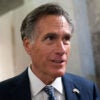A large explosion Tuesday at the Port of Beirut, Lebanon’s main port, killed at least 100 and wounded 4,000 others, authorities say. The president of Lebanon said the explosion was caused by 2,750 tons of ammonium nitrate that was not safely stored.
Was foul play involved? How should Lebanon respond? Are there likely to be any shifts of power because of what happened? Jim Phillips, senior research fellow for Middle Eastern affairs at The Heritage Foundation, joins the podcast to discuss.
We also cover these stories:
- Sally Yates, deputy attorney general in the Obama administration, testifies before the Senate Judiciary Committee about investigating the 2016 Trump campaign.
- Rep. Chuck Fleischmann, R-Tenn., asks Attorney General William Barr to investigate the vandalism of Catholic churches across the country in recent weeks.
- New York City cracks down on out-of-state travelers by setting up checkpoints at the main entries to all five boroughs.
“TheDaily Signal Podcast” is available on Ricochet, Apple Podcasts, Pippa, Google Play, and Stitcher. All of our podcasts can be found at DailySignal.com/podcasts. If you like what you hear, please leave a review. You can also leave us a message at 202-608-6205 or write us at [email protected]. Enjoy the show!
We want to improve your podcast experience. Find our five-minute survey at dailysignal.com/survey. Again, that’s dailysignal.com/survey.
Rachel del Guidice: I’m joined today on “The Daily Signal Podcast” by Jim Phillips, he’s a senior research fellow for Middle Eastern affairs at The Heritage Foundation. Jim, it’s great to have you with us on “The Daily Signal Podcast.”
Jim Phillips: Well, thank you. It’s great to be here.
Del Guidice: So, on Tuesday there was a really huge tragic explosion in Beirut, which is the capital city of Lebanon. Can you bring us up to speed, Jim, on what happened?
Phillips: The Lebanese government has launched an investigation and the preliminary indications are that there were 2,700 tons of ammonium nitrate in the harbor which exploded, and ammonium nitrate is commonly used in fertilizer but it’s also used to make explosives and build bombs.
It looks, at this point, like it was an accident, at least the explosion, although it remains unclear what started the fire that led to the explosion.
But in the past there have been many huge explosions of ammonium nitrate, including in the United States in 1947, a ship carrying about 800 tons of ammonium nitrate, much smaller amount, exploded in Texas City, at a dock in Texas City, Texas, and it killed more than 400 people.
There’s also been explosions of that substance in France, in China. And in 2013, there was a Texas fertilizer plant that exploded, killing 15 people. So, although the explosion is suspicious, it is common for industrial accidents to happen with this very dangerous substance.
Del Guidice: On that note, on Wednesday, AP reported that Lebanon is putting [an] unspecified number [of] Beirut port officials under house arrest after this huge explosion, and that the move comes amid speculation that negligence was to blame for the blast that devastated the Lebanese capital.
What is your perspective on their response and what they’re saying here about how they’re putting all these officials under house arrest?
Phillips: Well, there were reports that the Lebanese authorities confiscated this ammonium nitrate from a ship in 2013 that was traveling from Georgia to Mozambique. And I think the reason the government is focusing on negligence is because that huge amount should not have been stored so, apparently, casually in a port for all that time, because it did pose a threat to any nearby people.
Initially, many people suspected this could be a sign of the growing tensions between Hezbollah and Israel. And Hezbollah has been known to smuggle weapons through the port and it may have owned the warehouse where these explosions happened. And if so, it may have been holding onto this explosive material to use it against Israel, either in some of its missiles or in bombs or [improvised explosive devices], so that could have been motivation for keeping such a dangerous substance in the port.
Del Guidice: Overall, Jim, looking at everything that’s happened so far, … what the Lebanese president has said as well as others in government, what do you think of the response of the prime minister and others in leadership roles?
Phillips: First of all, let me say, the prime minister is walking on eggshells because the Lebanese government is extremely unpopular with a huge portion of Lebanese people. And Prime Minister Hassan Diab is seen as kind of a puppet of Hezbollah. Hezbollah is … not only the largest military militia in Lebanon, but it also plays a very powerful behind-the-scenes role in propping up this unpopular Lebanese government.
So, I think one of the reasons he seized on negligence as an issue is that it’s a way of responding to the crisis and appeasing many Lebanese that are up in arms about this as well as systemic corruption and mismanagement of the Lebanese economy, as this allows him to blame port officials rather than Hezbollah, if Hezbollah was involved in this huge explosion.
Del Guidice: Jim, how likely do you think it is that Hezbollah is involved?
Phillips: I think it’s very likely it’s involved one way or another. I don’t think it set off the explosion because it controls substantial parts of the Port of Beirut and that would be hurting its own interests, but I think it definitely had an interest in tapping into that ammonium nitrate for its own purposes, for terrorism and military clashes.
It has been known to be looking for ammonium nitrate through Syria. And we’ll never know now, but I’ll bet that a substantial part of that ammonium nitrate was already siphoned off by Hezbollah for its own purposes.
But I think Hezbollah will face a backlash by the Lebanese people, they’re already fed up with it’s very arrogant behavior, and the fact that its dragged Lebanon into repeated clashes with Israel in order to serve the interests of Iran, not Lebanon. And I think in the long run, this will be another point against Hezbollah. But in the short run, Hezbollah is in substantial control of Lebanon, so I think it will do everything it can to block a full investigation.
Del Guidice: Well, Jim, Amnesty International, they’re calling for this explosion in Beirut to be independently investigated, would you agree with what they’re asking for?
Phillips: I think that would be a good move in part because it’s not just foreign observers that distrust the Lebanese government but it’s also the Lebanese people, and I don’t think they will be satisfied if there’s some kind of a whitewash job done here.
Del Guidice: What should people know about Lebanon and its role in the Middle East as this happens as well as how the area and politically there might be changes coming due to all that has happened?
Phillips: Well, Lebanon was once seen as one of the most cosmopolitan and tolerant democracies in the Middle East, but it has, unfortunately, fallen into … very polarized and bitter factional struggles between many segments of it’s multiethnic, multisectarian society.
There’s a very weak state, which is ruled by a corrupt oligarchy, not only Hezbollah and its henchmen but others sects. There’s 18 religious and ethnic groups in Lebanon and many of them have their own political parties, that when they join the government they get control of a Cabinet department and they really milk that department to sustain their own constituents and their fellow ethnic and religious groups.
That has been a formula for incredible corruption and economic mismanagement. [It] also led to a huge political explosion … last fall when many Lebanese people—including Shia, that normally would support Hezbollah—protested in the streets against the Hezbollah-dominated government.
So, there’s an economic crisis, a financial crisis, over all of that, there’s this COVID epidemic, or pandemic, that has really destroyed Lebanon more than most other countries. Lebanon also is burdened with an estimated 1 million refugees from Syria who also are very exposed to the virus. So, it’s not a very pretty picture.
Del Guidice: Jim, how likely do you think it is that there might be shifts of power because of what’s happened here?
Phillips: That I think is a $64 question. I mean, if I was more optimistic, I would say in the long run the Lebanese people will rise up and form a better government. But the problem is, it’s so easy for Hezbollah leaders and other leaders of other ethnic and religious communities to demonize the other factions, and refrain from making the very hard sacrifices that will be necessary to put Lebanon on the right economic and political path.
Del Guidice: And lastly, Jim, not only has the city been changed in the way it appears due to all the buildings that have been leveled and all the lives that have been lost following this explosion, but how else do you expect the city to change? What are the things … you see coming down the pike as it tries to recover from this?
Phillips: I think it’s going to be very difficult for it to recover from this. Because in the past, Lebanon was bailed out despite its incompetent and corrupt government, it was bailed out by the rich Arab oil states of the Persian Gulf or by France, which was the colonial power that gave Lebanon independence, or by the [International Monetary Fund] and World Bank.
But now, because Hezbollah is such a power behind the throne, the United States, and the Arab oil kingdoms, and many Europeans are reluctant to give Lebanon more aid because it’s just wasted the aid in the past and there’s no sign of real change. So, unfortunately, I think as long as Hezbollah is in a position where it dominates Lebanon, all Lebanese will suffer.
Del Guidice: Jim, thank you so much for joining us today and for bringing a perspective to this situation, it’s been great to have you.
Phillips: Well, thanks a lot.































